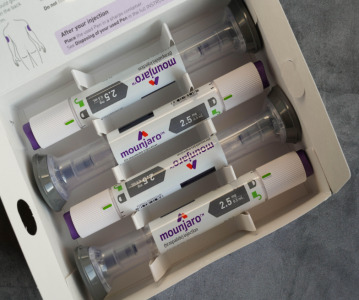SMC Makes Negative Recommendation for Abraxane, Treatment for Metastatic Pancreatic Cancer

Abraxane (paclitaxel formulated as albumin bound nanoparticles; nab-paclitaxel) in combination with gemcitabine, has not been recommended for use within NHS Scotland by the Scottish Medicines Consortium (SMC) for the treatment of metastatic pancreatic cancer, despite demonstrating a significant increase in overall survival when compared to the current standard of care, gemcitabine.[1,2]
Ms Alex Ford, Chief Executive of Pancreatic Cancer UK, on the SMC decision, said: “As a charity that speaks to patients and carers right across the UK on a daily basis, we are extremely disappointed by this decision especially as this treatment is available across the border in England. Given that most patients are diagnosed at a point when the disease is too advanced to treat, the negative SMC advice on Abraxane could potentially affect a significant number of patients with the disease each year.”
Currently, pancreatic cancer is the fifth most common cancer killer in the UK with almost 8500 people diagnosed each year.[3,4] In Scotland, survival rates for pancreatic cancer are similar to the rest of the UK with approximately one in six patients with advanced disease surviving for one-year after diagnosis.[5] Despite this, nab-paclitaxel in combination with gemcitabine, will not be made available through NHS Scotland for eligible Scottish patients as it is available for patients in England through the Cancer Drugs Fund (CDF).
In addition, around 80% of patients are diagnosed once the cancer has already reached an advanced stage, when a cure is no longer an option.[6] Five-year survival rates have not changed in 40 years[7] with metastatic pancreatic cancer affecting about 700 people in Scotland each year.[8]
Sam Pearce, Vice President and General Manager, Celgene UK & Ireland, said: “The decision by the SMC
not to recommend Abraxane, a life-extending treatment, is devastating news for anyone suffering from
metastatic pancreatic cancer in Scotland. We are committed to exploring all opportunities to ensure that
patients in Scotland can access this treatment and hope to re-submit to the SMC within the next few
months.”
References
[1] Goldstein D et al. Updated survival from a randomized phase III trial (MPACT) of nab-paclitaxel plus gemcitabine versus gemcitabine alone for patients (pts) with metastatic adenocarcinoma of the pancreas. American Society for Clinical Oncology Gastrointestinal Cancer Symposium (ASCO GI). Oral presentation. January 2014
[2] Celgene data on file. January 2014
[3] Mukherjee et al. Gemcitabine-based or capecitabine-based chemoradiotherapy for locally advanced pancreatic cancer. The Lancet Oncology 2013; 14(4): 317-326.
[4] British Medical Journal. Pancreatic adenocarcinoma. 334:e2476. Available at: www.bmj.com/content/344/bmj.e2476?variant=pdf. Published May 2012. Last accessed May 2014
[5] Pancreatic Cancer Action. UK Pancreatic Cancer Prognosis And Survival Rates https://pancreaticcanceraction.org/pancreatic-cancer/stats-facts/prognosis-survival/. Last accessed May 2014
[6] Pancreatic Cancer UK. Study For Survival 2011. www.pancreaticcancer.org.uk/media/100292/report_final_for_web.pdf Last accessed May 2014
[7] Pancreatic Cancer Research Fund. Cancer Facts and Figures. Available at: www.pcrf.org.uk/pages/cancer-table.html Accessed May 2014
[8] ISD Scotland: Cancer statistics: www.isdscotland.org/Health-Topics/Cancer/Cancer-Statistics/Pancreatic/ Last accessed May 2014
Related News
-
News The next 15 drugs up for negotiation with Medicare include several blockbusters
By now, everyone is quite familiar with the drug price negotiations taking place between drug companies and the Centres for Medicare & Medicaid Services (CMS) in the USA as part of measures being taken to reduce the cost of drugs for patients, to make ... -
News PSCI Welcomes Delpharm, Samsung Biologics, and Suven as First Supplier Partners
The pharmaceutical industry continues to evolve with an increasing focus on responsible sourcing, sustainability, and collaboration across the supply chain. Under a new model to recognise suppliers within the pharmaceutical and healthcare industry that... -
News Drug prices agreed upon as part of the US Inflation Reduction Act
The Inflation Reduction Act brought into constitution by the Biden administation in 2022, which proposed a drug price negotiation between the government and pharmaceutical companies, has reached it's first agreement. -
News Eisai Alzheimer’s drug authorised in UK but still faces obstacles
In partnership with BioArctic AB, pharmaceutical company Eisai has been granted Marketing Authorisation by the Medicines and Healthcare products Regulatory Agency (MHRA) for its Alzheimer’s disease drug product Leqembi. -
News Eli Lilly's weight loss drugs removed from the FDA's shortage list
The US FDA have recently updated their drug shortage list. The recently released list shows that all dosage forms of Eli Lilly's weight-loss drug Zepbound and their diabetes drug Mounjaro are now available. -
News Global advancements in the diagnosis and treatment of rare diseases: Rare Disease Day 2024
Rare Diseases Day is celebrated on the 29th February 2024 and represents the plight of rare disease patients to gain diagnosis and access to suitable treatment. -
News Pharmaceutical industry supports COP28 health stance in joint statement
As COP28 takes place over this week in Dubai, UAE, several bodies in the pharmaceutical and health industries have come together to announce support of key movements in sustainability in the sector, and to recognise sustainability as a health issue.&nb... -
News Biden backs Cold-War measures to shore-up medical supply chains
In a recent strategy to combat rising inflation and the cost of living crisis, President Joe Biden has invoked a Cold War-era act to increase investment in a selection of medicines and supplies.
Recently Visited
Position your company at the heart of the global Pharma industry with a CPHI Online membership
-
Your products and solutions visible to thousands of visitors within the largest Pharma marketplace
-
Generate high-quality, engaged leads for your business, all year round
-
Promote your business as the industry’s thought-leader by hosting your reports, brochures and videos within your profile
-
Your company’s profile boosted at all participating CPHI events
-
An easy-to-use platform with a detailed dashboard showing your leads and performance



.png)



